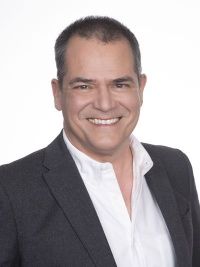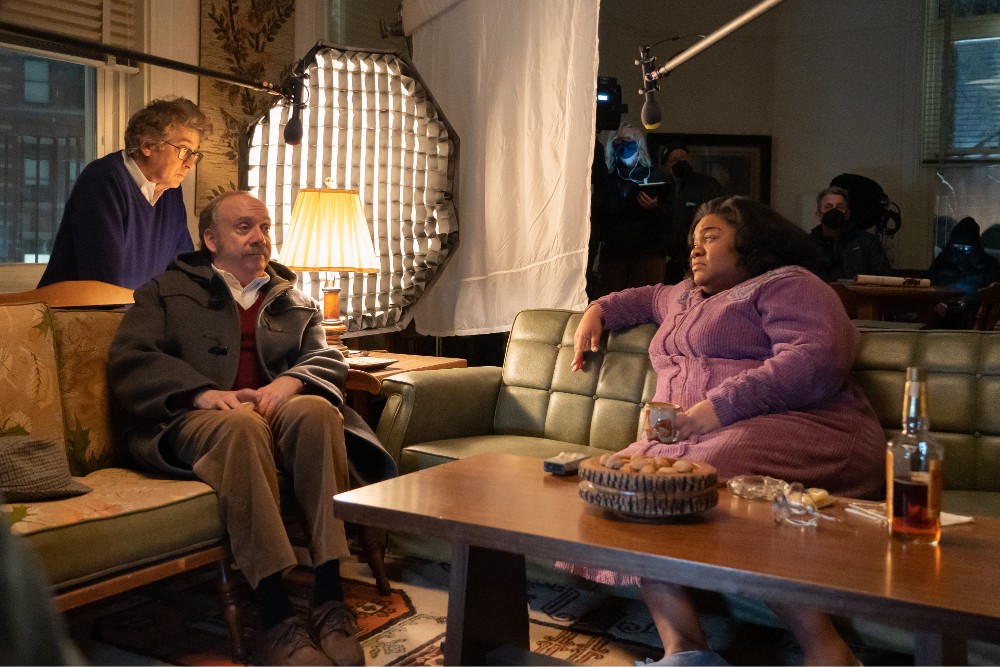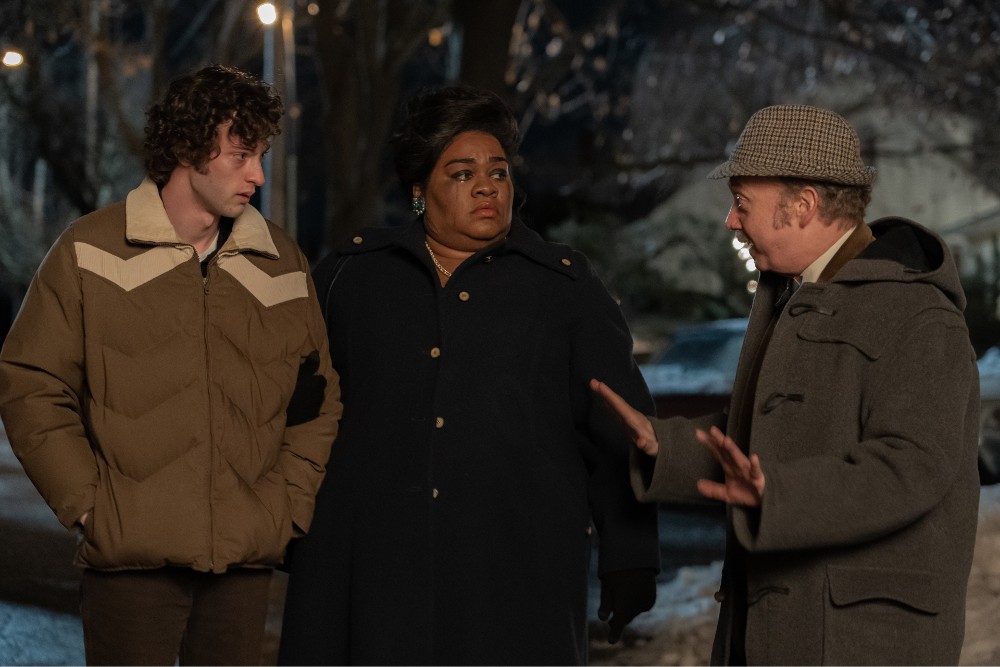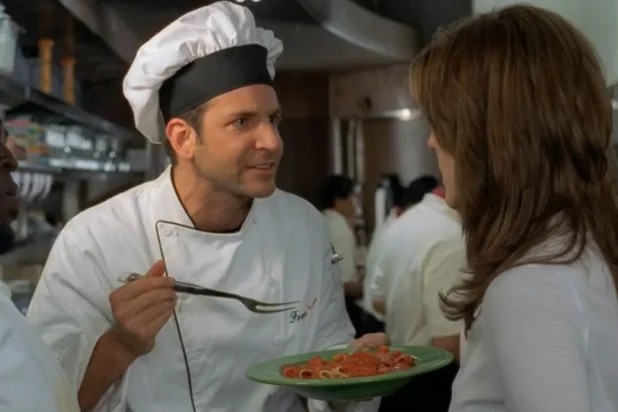For screenwriter and producer David Hemingson, his journey to performing those duties on The Holdovers for director Alexander Payne was something that could only happen in a Hollywood movie. Hemingson had quite a thriving career working in television and still does, but one day, Payne read Hemingson’s screenplay for a planned pilot, and realized that he’d be the best writer to tackle an idea Payne had wanted to pursue.
In The Holdovers, Paul Giamatti plays Paul Hunham, a history professor at the exclusive private school, Barton Academy, where he’s been commissioned with staying over the holidays to watch over the students who, for whatever reason, have no play to go. One of those students is Dominic Sessa‘s Angus Tully, a troubled teen from a broken home whose mother decides to go on a honeymoon with her new spouse rather than spending the holidays with him. Hunham and Tully have already been butting heads during school, but the thought of spending the holidays together is not something that thrills either of them. Also at Barton is Mary, the head cook at the school’s cafeteria, played by Da’Vine Joy Randolph (My Name is Dolemite), who has her own issues to deal with after losing her son.
The Holdovers is a truly unique new project for Payne that relies heavily on Hemingson’s own New England background, though transplanted back into the ‘70s where Payne thrives as a filmmaker to create something in the vein of The Graduate or the films of the great Hal Ashby. Hemingson’s screenplay already has great odds not only to get nominated for Original Screenplay at the Oscars, but possibly even win that category.

Above the Line spoke with Hemingson earlier this week to get some idea how this all came about and what he brought from his own background into the mix. We also got to ask him about one of his older shows, Kitchen Confidential, based on the life and career of the late Anthony Bourdain.
Above the Line: I know you’ve worked in television for many years, so is The Holdovers really your first produced feature screenplay?
David Hemingson: Yeah, this is my first produced feature. I have actually written one or two movies before, but in terms of produced feature, absolutely, and just kind of a miraculous occurrence, the way it all came together. It was surreal the way it all happened, but obviously, I’m ecstatic that it did.
ATL: I went to a screening where Alexander did a QnA afterwards. He sort of explained how it came together, but I’d love to hear it from your own perspective, since it’s probably a little different when you get a call. I don’t know if you knew him beforehand…
Hemingson: Nope, just called me out of the blue. We’ll see how Rashamon this is. My version of the story is that I was driving back from LAX. I was running a show called Whiskey Cavalier for ABC, and I’d been flying back and forth to Prague; it’s like a 14-hour flight. I got off, and I was dog-tired to the point of delirium. I’m in the car and the phone rings and a voice on the end of the line says, “David Hemingson, Alexander Payne.” First, I thought it was a joke, because I had a friend who liked to call me up and pretend to be an artistic luminary, and then bait me into thinking he’s Francis Ford Coppola, and then tell me I’m an idiot, and ask me if I wanna get a beer. I thought it might have been a joke, so I was about to hang up, when I saw the Omaha area code. What had happened was my then-agent-now-manager, I wrote this pilot called Stonehaven, which was a 90% autobiographical story of me going to this prep school in Hartford, Connecticut, as kind of a scholarship kid in 1980. I guess my manager-then-agent gave it to another client of his who had gone to film school with Alexander and knew Alexander wanted to do something in this arena, gave the script to Alexander. Alexander read the pilot, and the reason he called me was to say, “I love this.” I was like, “Oh, my God, he’s gonna make my TV show.” And then he said, “But I don’t want to make it.” So dream is born, dream dies within about five seconds, but he said, “Would you consider writing a film for me in the same arena?” That’s kind of how it all happened. I don’t know if that’s what he told you.
ATL: More or less. I don’t remember him mentioning your pilot, but he mentioned reading something you wrote and wanting something new in that vein. Did he give you any kind of direction other than it being set in the ’70s, or character-wise?
Hemingson: Even at first it was like… and keep in mind, this is two minutes into our relationship, and he was like, “Would you be interested?” How do you say no to that? Of course, I’m interested. And he said, “A couple questions. First threshold question: 1958 or 1970?” I instantly said,” 1970,” and he asked, “why?” That time was 2018, and I said that 2018 has more in common with 1970 than 2018 has in common with 1958. I think that ’70 in 2018 and certainly this carries up until now, the disconnect between the haves and have-nots in terms of the terrible problems we have with racial justice. All that stuff was very at the forefront in ’70 and very at the forefront in 2018. Also, I wanted to dodge Dead Poets Society, which is ’58. So I’m like, “Let’s go in that direction.”

And then he said, “Okay, well, here’s what I want it to be. I want it to be about this odiferous, ocularly-challenged professor, stuck holding over his punishment with these kids, one of whom his mother has abandoned him to go on her honeymoon.” That’s what I had to begin with, so there’s your setup. Whether those kids stuck around was up to me. The Mary character didn’t exist in the original conversation. It was very much that one-breath logline, here it is, and then I just ran with it. I literally wrote and would send him stories, and he’d be like, “Okay, I like this, I don’t like this.” I’d get notes from him, and I’d shape the screenplay, according with his notes, and that extended to writing the first act and the second act, and then the third act. He gave me remarkable free rein, and was very generous and decent in his criticisms and his notes, but we have a good strong working relationship, and the nature of that relationship, and the nature of our connection was pretty immediate. There were very few speed bumps on this one.
ATL: He also brought you on as producer, which makes one think “Alexander Payne is a writer, why does he need to hire a writer?” but he also produced some of his own movies. (Note: Payne is not listed as a producer on The Holdovers.) How did that transition come about?
Hemingson: One of the reasons he wanted me to write it to begin with was that I really understood this world. I was born in New Haven, Connecticut, and I grew up in New Haven and West Hartford. I went to this school for six years, and then I went off to college at one of the older institutions. I knew about these traditions, I knew about the culture. I think that as a producer, for example, everything from, “Okay, what’s the size of the picture that Curtis would have in that chapel? How big would it be? What do the choristers wear in 1970?” For example, early on, when you see the opening of the picture, when you notice those long tables and the family-style eating, you’ll notice that the underclassmen are serving the upperclassmen. At the teachers’ table, then called the master table, was higher than everybody else’s table. The politics and the niceties of how people would deal with each other in these situations, how teachers would address students, how students would address each other, the frictive elements of it, the Lord of the Flies component of these boys together. I knew all that extremely well, and I think the reason that he wanted me to be a producer on it — I wanted to be a producer on this — because I wanted to be able to get in there and go, “Okay, here’s the real of it. Here’s how I calibrate this.” Obviously, he’s the master of time, space and dimension, so he takes care of all of it, but I wanted to be there to lob in these thoughts, and I think he valued that. I know it was a great experience for me.
ATL: I’m talking to Ryan, the production designer, tomorrow, so I’m going to ask him about those tables.
Hemingson: Ryan Warren Smith is a brilliant guy. He understood the essence of these schools, and he understood how to tone it for 1970. The granular detail in Paul’s rooms, everything from the right bottle of whiskey to the period-specific Preparation H that’s in there. Everything was perfectly calibrated towards the 1970.
ATL: At what point did Alexander say, “Of course, Paul Giamatti is going to play Paul Hunham…”?
Hemingson: Second or third conversation, very early on, very early on. I mean, the way he framed it, because Alexander is so incredibly gracious, and very Midwestern in some respects. He was like, “I just had a thought. I wondered if you’d be available for the thought.” I was like, “What’s this odd, AP?” And he’s like, “Well, what about Paul Giamatti?” I said, “You mean Paul Giamatti to play the professor? I can’t think of a better idea than that. That’s the best idea ever.” So immediately, I named him Paul — this is fairly early on — and started writing it with Paul Giamatti in mind. This is about a year plus before he signed on, so it was kind of a roll of the dice. I’m glad he decided to do it.
I watched his other performances, and I felt like I already had his rhythm and my rhythm or the rhythm for Professor Hunham, I kind of saw where the intersection was, the Venn diagram. I’ve seen all of his movies, but he made a movie called Win Win that was just great. There’s a quiet, earnestness about him that I want to see in some of the lower moments from Professor Hunham. I tailored the role for him, I wrote it for him.

ATL: As a producer, were you involved with the process of finding Dominic to play Angus? That’s such a key role, so do you find an actor who could just slip into that role, or do you mold the character more towards Dominic’s personality?
Hemingson: The strangest thing is that by the time Dominic showed up, the character was pretty much locked in, and he just sort of performed it. He really didn’t change anything off the table read, but to answer your question, we had this massive search across the English-speaking world – Susan Shopmaker, our casting director, looked everywhere. There were a bunch of A-list young actors up for it, and Alexander is very specific, he knows exactly what he wants. We’d been looking everywhere, and we weren’t finding it. I must have looked at 60 or 70 kids in the semi-final round, and then, the Deerfield Academy drama department, one of the schools we’re shooting at… senior in the Deerfield Academy drama department shows up — Dom Sessa — and the audition piece was the monologue I wrote in the restaurant. Starts with, “He used to be fine, he used to be my dad.” I built five turns into that monologue, and up until Dom, nobody really got the turns as profoundly, or understood how to pause and pivot within the speech. Dominic organically just knew what the spaces were. It wasn’t ultimately the performance you see on screen, because he worked with Alexander obviously, and with Paul Giamatti, but the kid had an immediate and undeniable brilliance and talent and charisma that this is absolutely the kid. Plus, he’s got those flying buttress cheekbones. He’s so beautiful to photograph. Our cinematographer [Eigil Bryld] was always like, “My god, this lighting, this kid, he’s so dramatic and so interesting to look at.” He was just sort of the kid from the get-go. As soon as we saw him, we were like, “That’s the kid.”
ATL: Alexander has also opined the fact that mid-range dramas are being relegated to arthouses, whereas back in the ’70s, they were being made by studios. When you make a movie like this, as a writer-producer, are you taking into consideration what kind of budget you might be able to get for this, even with Alexander on board as director?
Hemingson: Absolutely. He also cites the mid-range to high-range [movies] like Out of Africa; those movies really don’t get made anymore, the bigger budget ones. But the mid-range ones, absolutely. He likes to say if somebody in your movie flies, you can get $100 million; nobody flies, you get $25 million. We couldn’t find a place for anybody to fly in the movie – the budget would have been larger if we had – but yeah, you’re constantly aware of stuff. Having worked in television for 27 years, the amount of money that we spent on craft service alone would make some of the movies that I’ve been recently enjoying on the independent side. It’s crazy, but I think that sort of budgetary limitation drives creativity in a certain way. Necessity is the mother of invention. I think that’s where somebody like Ryan comes in, a brilliant production designer, or the way Eigle shoots it in conjunction with Alexander. Any of the things that have to do with actual physical production. We didn’t build anything for this, by the way; this is all practical. There wasn’t a single set. Normally, you have to build some sort of return or some kind of hallway thing. Nothing. The whole thing is practical. I think if you have a filmmaker of Alexander’s stature, then with that budget, you can do extraordinary things, because he’s a gifted humanist who’s just a cinematic genius, so he gets what he needs.
ATL: One of the parts I really enjoyed was the trip to Boston, since it reminded me of a trip I took to Boston with my father in the early ’70s when I was much younger than Angus. Was that Boston trip something AP suggested he might want put into the story?
Hemingson: No, basically, he gave me the logline. He said, “I wouldn’t mind getting them off campus, if you’re feeling it.” It’s funny you mention Massachusetts, because the reason I set it originally – Barton was Deerfield in my imagination, and it was a Massachusetts prep school. Even though I didn’t go to boarding school, I used to go and run I ran cross country and debate and stuff, and we’d go up and do that at the super-swanky prep schools in Massachusetts. The Boston trip just became something appealing. I was gonna set it in Connecticut, and if I had, I would have been able to see my whole family, but Masschuessets was more appealing [with a] very different culture. The Boston trip, I wanted to do something like a big city, I wanted to get them out, break them out, and going to Boston was my way of taking them out and bringing them closer. I wanted to push them off axis, because I felt like the student-teacher dynamic, we’d end up playing it over and over and over again, unless we uncoupled them from that arena. Getting them to Boston allowed more of a crisis situation to occur, allowed more backstory to unfold. if that makes sense. That’s why I wanted to do it, and plus Alexander loves a road picture, so…

ATL: I wanted to ask you a little bit about Kitchen Confidential, the show you created back in the day. I saw the show before I read Anthony Bourdain’s book, and when I read the book, I thought it would have made an amazing R-rated movie. It’s such a different thing as a television show, so did you ever want to go back and do more with that?
Hemingson: My God, I’d love to. It was a movie originally before I got a hold of it back like 18 years ago. It was a movie that David Fincher was gonna make with Brad Pitt called Seared.
ATL: Didn’t Bradley Cooper eventually end up in that one, too?
Hemingson: No, he was in Burnt, which honestly was sort of a knock-off of Kitchen Confidential. The truth of the matter was I loved making that show. I wanted that book in galleys. I took 50 grand – I didn’t tell my wife – all the money we had in the world, and I tried to option it. It had been bought up for 10 times that amount in galleys, so I waited for the job came open and I went and talked to Darren Star and begged, wheadled, and pleaded convinced him that I was the only person who could possibly write this. I spent time as a everything from a line cook in college, a garde mangé chef at this restaurant called Shenanigans in Hartford, they had a piano bar and a great big brandy snifter, you put the money in like Piano Man. I had that restaurant background as a bartender, as a waiter, as a cook. I just needed to make that show, I just loved it too much. It was a transformative experience and working with Bradley was amazing.
The Holdovers opens in select cities on Friday, Oct 27, before being released nationwide on November 10. Look for more interviews from the movie soon over at Below the Line.



